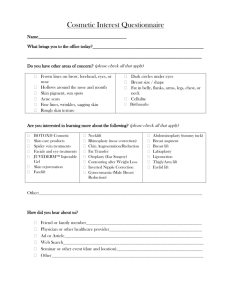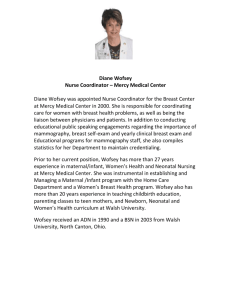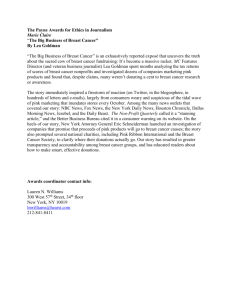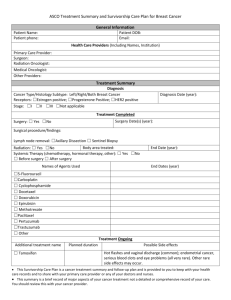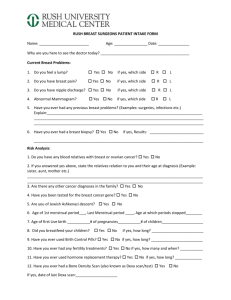2016 round of the Priority-driven Collaborative
advertisement
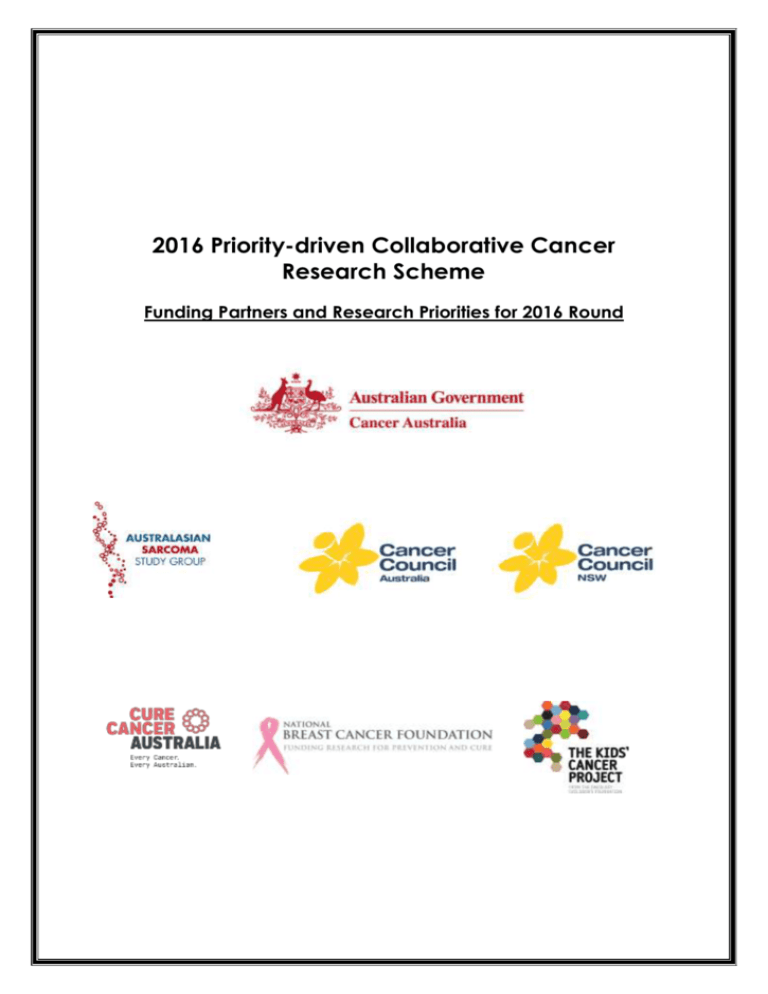
2016 Priority-driven Collaborative Cancer Research Scheme Funding Partners and Research Priorities for 2016 Round Cancer Australia Cancer Australia’s framework of research priorities relate to specific areas of cancer research, tumour types and populations with poorer outcomes. In looking to support research in these areas, Cancer Australia encourages research which focuses on emerging issues, innovation and novel approaches. Origins and causes of cancer Aetiology Exogenous Factors in the Origin and Cause of Cancer. Prevention of cancer Prevention Personal Behaviours That Affect Cancer Risk; Nutrition, Chemoprevention, or Vaccines. Early Detection and Treatment of cancer Early Detection, Diagnosis & Prognosis Technology and/or Marker Evaluation or Testing in a Clinical Setting. Treatment Discovery and Development of Localized Therapies; Clinical Applications of Localized Therapies, Systemic Therapies or Combinations of Localized and Systemic Therapies. Cancer Control, Survivorship & Outcomes Patient Care, Survivorship Issues, or End-of-Life Care including Complementary and Alternative Approaches; Health Services, Economic and Health Policy analysis and Surveillance; Behaviour, Education and Communication. Tumour types Research addressing cancers of the lung, colon and rectum, pancreas, cancer of unknown primary, lymphoma, kidney, bladder, stomach or oesophagus is strongly encouraged. Translational research Translational research involving the testing or application of technologies, markers and therapies in a clinical setting; Translational research associated with surveillance and prevention of cancer; Translational research to improve: patient care, survivorship, supportive and end of life care, health services, economic and health policy. Populations with poor and unwarranted variations in cancer outcomes Cancer research focusing on populations who experience poor and unwarranted variations in cancer outcomes is strongly encouraged, including variations by: Aboriginal and Torres Strait Islander status; socioeconomic status; geographic location. Cancer Australia: gynaecological cancers Cancer Control, Survivorship & Outcomes research in gynaecological cancer Patient Care, Survivorship Issues, or End-of-Life Care including Complementary and Alternative Approaches; Health Services, Economic and Health Policy analysis and Surveillance; Behaviour, Education and Communication. Translational gynaecological cancer research Testing or application of technologies, markers and therapies in a clinical setting; Surveillance and prevention of cancer. Populations with poor and unwarranted variations in cancer outcomes Gynaecological cancer research focusing on reducing unwarranted variations/ improving outcomes for Aboriginal and Torres Strait Islander women is strongly encouraged. Endometrial cancer research Applications which encompass endometrial cancer research are particularly encouraged. Cancer Australia: lung cancer Research that focuses on improving outcomes for people with lung cancer, including prevention and treatment of brain metastases; Research that focuses on the prevention and early detection of lung cancer, to assist in diagnosing patients at an earlier stage of disease; Research that focuses on reducing the variations in lung cancer care, including access to curative treatment and improvements in the coordination of care across the lung cancer pathway; Research into patient focused symptomatic, supportive and end-of-life care, particularly for people with advanced lung cancer; Research that further focuses on the aetiology of lung cancer, particularly relating to the increased proportion of women diagnosed with lung cancer who were never smokers. The Australasian Sarcoma Study Group The Australasian Sarcoma Study Group wishes to fund translational research across all sarcoma types. Translational research should highlight the application of the discovery to the treatment of patients with sarcoma. Research falling under the category of translational research may encompass: Preclinical/early translational research – the translational process that follows fundamental discovery and precedes definitive, late-stage trials. Clinical/translational research – research at the clinical application end of the translational spectrum which is focussed on the testing of technologies or markers in a clinical setting, and the clinical application of localised and/or systemic, or complementary and alternative approaches to treatment. Epidemiological research/cancer prevention – research focussed on the surveillance and prevention of cancer. Patient outcomes research and survivorship – research primarily focused on needs in the area of patient care and survivorship, and may include patient care, supportive care, survivorship. Cancer Council Australia Populations with poor and unwarranted variations in cancer outcomes Cancer research focusing on populations who experience poor and unwarranted variations in cancer outcomes is strongly encouraged, including variations by: Aboriginal and Torres Strait Islander status; socioeconomic status; geographic locations. Cancer Council NSW Cancer Council NSW invites research applications that address one or both of the following: a) Research that is categorised in Common Scientific Outlines including: i) ii) iii) Aetiology; Prevention; Cancer control, survivorship & outcomes research; and/or b) Research that focuses on specific tumour types including: i) ii) iii) iv) v) head and neck; lung; lymphoma; oesophagus; pancreas. Cure Cancer Australia Cure Cancer Australia wishes to fund innovative, high-achieving, early-career researchers, and will be assessing the applicant's track record and publications (relative to opportunity). Applicants are advised to consider the following research priorities in their applications: Project grants will be awarded in any field of research (including basic laboratory, epidemiology, psychosocial, translational, and clinical) into malignant disease; Cure Cancer Australia aims to provide ‘start-up’ funding to support postdoctoral researchers with less than seven years post-doctoral or less than seven years post-MBBS experience at the time of application; We select for leadership and innovation as well as scientific excellence, therefore the applicant must nominate themselves as sole Chief Investigator of their project. This assists early-career researchers to advance their research and to increase their competitiveness for funding from other granting agencies in the future. Please note that this funding cannot be used as part of a larger PdCCRS project grant application. Cure Cancer Australia funding may be used for the applicant's own salary, or the salary of a research assistant, and/or research materials for the specified project. National Breast Cancer Foundation Prevention and Risk Research about potential methods for the prevention of breast cancer; Research about how health and lifestyle factors, such as diet, exercise and stress, affect a person’s risk of breast cancer. Early Detection Research into effective methods for the early detection of breast cancer; Research into improving the quality and effectiveness of breast screening. Familial breast cancer Research into genes involved in hereditary breast cancer and methods to determine those at high risk of developing familial breast cancer. Novel therapies Research into the development of new therapies, and other repurposing of therapies used for other disease areas, to improve treatment outcomes for patients with breast cancer; Research into new technology for detecting and treating breast cancer. Personalising treatment Research into the complexity of breast cancer sub-types; Research into optimising cancer treatment and determining which patients will benefit from different treatment approaches. Advanced breast cancer Research into the causes and drivers of breast cancer cells spreading to other parts of the body; Research into new therapies to stop spread of breast cancer. Survivorship Research into the physical, psychological and emotional effects of life after breast cancer treatment; Research into improving quality of life, health and wellbeing for patients after breast cancer treatment through exercise and weight loss. Young women Research into key issues relating to breast cancer in younger women including breast cancer in pregnancy, fertility and early menopause; Research into triple negative breast cancer – a specific type of breast cancer common in young women. The Kids’ Cancer Project The Kids’ Cancer Project is seeking to support research which will have the greatest impact on childhood1 cancer survival. The Kids’ Cancer Project defines a child as an individual up to the age of 18 years old Improving Survival and Treatment Research into best practice and emerging technologies spanning all modalities of treatment towards improving treatments for childhood cancer to directly impact on survival rates Long term effects of cancer survival Research into improving the quality of life of childhood cancer survivors Causes of childhood cancer Research into the underlying causes of childhood cancer


